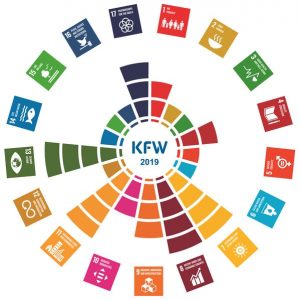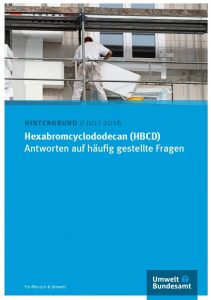8:21 min - posted on 2019-09-18
Keywords: Stakeholders, DE-News, Movies, Movies 4 to 10 Min, Climate protection, SDG 2030, Environmental policy, Ecology
8:21 min - posted on 2019-09-18
 KfW is today publishing the results of the SDG mapping of new commitments throughout the Group in 2019. In order to clarify the individual contribution made by KfW's new commitments to achieving the UN Sustainable Development Goals, KfW has developed a standardised procedure: 1,500 indicators are used each year to determine to which SDGs KfW's new commitments can be assigned. This makes the contribution transparent at both group and business sector level.
KfW is today publishing the results of the SDG mapping of new commitments throughout the Group in 2019. In order to clarify the individual contribution made by KfW's new commitments to achieving the UN Sustainable Development Goals, KfW has developed a standardised procedure: 1,500 indicators are used each year to determine to which SDGs KfW's new commitments can be assigned. This makes the contribution transparent at both group and business sector level.
The mapping of individual new commitments from 2019 to the Sustainable Development Goals shows the following funding priorities:
"With more than EUR 28 billion for 'climate action', we are one of the most important supporters of the Paris climate goals worldwide," explains Dr Günther Bräunig, Chairman of the Executive Board and Chief Sustainability Officer of KfW Bankengruppe. "The fact that we are also making substantial contributions to all other 16 SDGs at the same time shows how we combine the environmental with the economic and social dimensions of sustainability as part of our broad legal mandate."
The financial sector can and must make significant contributions to the efforts to achieve greater climate protection and sustainability. As a transformative promotional bank, KfW is assuming particular responsibility in this regard and already launched the "KfW Roadmap Sustainable Finance" project in summer 2018, the aim of which is to develop a stringent and multidimensional sustainability concept for the bank. One of the first results is the group-wide SDG mapping, which makes KfW's contributions to the Sustainable Development Goals (SDGs) transparent. With this volume-based and largely automated mapping approach, KfW is one of the pioneers worldwide in terms of recording and publishing SDG financing targets.
Since the initial publication of the SDG mapping of KfW's 2018 new commitments in September 2019, international interest in KfW's SDG mapping has been high. Many partners are currently planning similar publications and would therefore like to learn more about KfW's own mapping methodology. An exchange to this effect has now taken place with several European promotional banks and multilateral organisations, among others.
Detailed information on KfW SDG mapping:
www.kfw.de/sdgs
Source: KfW-PM dated 9.3.2020
Keywords:
DE-News, Renewable, Funding, Climate protection, Sustainable management, New books and studies, Quarters, SDG 2030, Settlements, City, Economics
The BUND and the ifeu - Institute for Energy and Environmental Research have produced various studies on building issues in the last 10 years, including "13 measures against energy waste in the boiler room".
This study now deals with the core issue of cost allocation for energy modernisation in rented buildings. As early as 2012, BUND, the German Tenants' Association (Deutscher Mieterbund) and the German League for Nature Conservation (Deutscher Naturschutzring) presented the basic idea of the so-called "one-third model". Costs and benefits should be shared between tenants, landlords and the state in as balanced a way as possible. This was and is linked to the premise of achieving a rent-neutral apportionment. In addition, disputes about the amount of the apportionment and the division according to maintenance and modernisation costs should be avoided or circumvented.
This study presents the basic features of the one-third model, but includes other factors that play a role in the modernisation levy, such as rent losses, property taxes or residual values in a specially developed calculation model. The calculations also take into account the different situations of private landlords and housing associations as well as different housing market situations such as growing, shrinking and constant housing markets.
Targeted support measures
hardship interception
Amount of the modernisation levy
The changes can only be introduced as a package. This is the only way to achieve the desired effect, namely to meet the climate protection targets and to balance the costs between the actors.
The basic idea of the one-third model, a fairer distribution of costs for all parties, can be applied to all cases examined. The desired result, the resolution of the apparent contradiction between climate protection and social security, is achieved for the various actors. Although public budgets share more than one third of the modernisation costs, they benefit to a greater extent from the economic advantages of energy efficiency.
BUND expects that an amendment to the tenancy law will implement the one-third model and that this can be supported by all participating agencies and associations. It would be a concrete contribution to integrate and implement the much-vaunted social component in climate protection measures. In this way, a higher level of acceptance for the urgently needed energy modernisation will be achieved - the rental housing stock will thus make its indispensable contribution to climate protection. The preservation of the building fabric will benefit just as much as the quality of living, if the living comfort is increased through proper energy modernisation.
Source: News Bund für Umwelt und Naturschutz Deutschland e.V. (BUND), September 2019
Keywords:
Stakeholders, Stock, DE-News, Climate protection, Media, Tenant electricity, New books and studies, News Blog Baden-Württemberg, Quarters, Settlements, City, Environmental policy, Housing, Housing policy, Thermal insulation, Ecology
 The flame retardant HBCD, which was mainly used in polystyrene insulation boards, has been banned since March 2016. But trouble looms from the many millions of cubic meters of HBCD-containing insulation material that have already been installed in Germany.
The flame retardant HBCD, which was mainly used in polystyrene insulation boards, has been banned since March 2016. But trouble looms from the many millions of cubic meters of HBCD-containing insulation material that have already been installed in Germany.
The flame retardant hexabromocyclododecane (HBCD) has been largely banned from trade and use in the EU since spring 2016. For a long time, HBCD was the economically most important flame retardant for polystyrene insulation materials - accordingly, there are still transitional rules for insulation materials made of expanded or extruded polystyrene (EPS/XPS).
While the industry in Germany has largely replaced HBCD with allegedly less problematic flame retardants since the end of 2014, homeowners in Germany are now threatened with considerable costs when converting their buildings and removing insulation materials containing HBCD: This is because these will be classified as "hazardous waste" from October 2016 and can only be disposed of at great expense in special waste incineration plants or plants specially approved for this purpose. According to estimates by the Federal Environment Agency, "considerable disposal costs" are to be expected for homeowners.
How can a consumer tell if a polystyrene insulation material contains HBCD?
Since HBCD has already been identified as a substance of very high concern under the REACH Regulation since 2008, the manufacturer and also the distributor must provide information on the use of the substance in all articles. An online form from the Federal Environment Agency can be used to ask the manufacturer, dealer or importer whether HBCD has been used as a flame retardant. In addition, since 2011, the Construction Products Regulation has also required the information to be provided to end users with the declaration of performance for the CE mark. However, for all polystyrene insulation boards used in the past, it must be assumed that they contain HBCD.
In the brochure "Frequently asked questions and answers on hexabromocyclododecane (HBCD) - Answers to frequently asked questions".
of the Federal Environment Agency of July 2016 provides further explanations: www.umweltbundesamt.de/...oekologische-kriterien-fuer
Keywords:
Building Biology, DE-News, New books and studies, Thermal insulation
Baden-Württemberg's Environment and Energy Minister Franz Untersteller has concluded the state's support programme for PV storage systems and described it as a success.
In March 2018, the green-led ministry had launched the "Grid-serving photovoltaic battery storage" funding programme and provided it with a total of 10 million euros. The programme was part of the state government's solar offensive. Specifically, the state supported the investment in battery storage for a newly constructed photovoltaic system. Since the subsidies were exhausted after only 17 months, despite several increases, the programme was closed this week.
"With our million-euro funding, we have helped it gain new momentum," said Untersteller. "With an increase of 44 megawatts peak photovoltaic capacity and 30 megawatt hours of storage capacity, we have achieved our goal and taken the energy transition in the state a good step forward."
11.7.2019 | Source: Ministry of the Environment Baden-Württemberg
Keywords:
Stakeholders, DE-News, Energy storage, Renewable, Funding, Climate protection, News Blog Baden-Württemberg, PV, Electricity storage, Environmental policy, Ecology